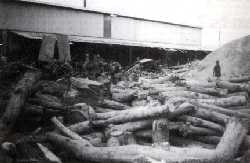
Research to hardsell
The industry throws its mantle to the Indian Institutes of Technology

The industry throws its mantle to the Indian Institutes of Technology
The Sindh Wildlife Department is opposing oil exploration in a national park in Pakistan

Sugarcane growers in Uttar Pradesh feel sold out to mills Frustration is growing among sugarcane growers in Uttar Pradesh. First private sugar mills refused to begin crushing and now the Lucknow
Forty thousand dams have rendered 60 million people homeless the worldover
T R Balu has to become more important for the environment than judges of the Supreme Court
Envisages generation of one million direct and indirect opportunities The plethora of subsidies and incentives announced in the new exclusive policy for the micro, small and medium enterprises (MSMEs) sector by the Tamil Nadu government will create a large employment potential. New opportunities will be thrown open for artisans, ITI and diploma holders in the state to come and set up their own units, according to small industry associations. Tamil Nadu has unveiled a separate policy for the MSME sector with a vision to enhance the competitiveness of the sector and aim for a sustained annual growth rate of over 10 per cent for MSMEs. The new MSME policy, apart from encouraging agro-based industries, envisages generation of one million direct and indirect employment opportunities during the 11th Five Year Plan. The new MSME policy pampers tiny manufacturing units with capital subsidy on plant and machinery, low-tension power tariff subsidy, subsidy on assessed VAT and stamp duty exemption. Over and above this, the additional subsidies for units set up by women entrepreneurs, physically disabled persons and trans-gender entrepreneurs will be highly rewarding and encouraging, says S Srinivasan, president, Ambattur Industrial Estate Manufacturers' Association. New entrepreneurs and the small scale sector could reap the benefits of the current policy and become a regular feeder sector for the vibrant medium and large-scale sector, especially active in the automobile and engineering sectors in the state, he adds. K Gopalakrishnan, honourary general secretary of Tamil Nadu Small and Tiny Industries Association, says the policy will give fillip to the MSME eco-system in the state. The subsidy schemes will help small industry upgrade technology and machinery, thereby enhancing their competitiveness. The purpose of announcing a separate policy for the MSME sector is to make it co-exist with large industries as well as accelerate industrial growth and generate large-scale job opportunities, especially in the rural and backward areas, says P Selvam, secretary, small industry, government of Tamil Nadu. "With this new policy, we expect MSME sector contribution to the total exports from Tamil Nadu to go up substantially from the present 35 per cent,' he adds. Growing industrial demand has driven expansion by several units in the industrial estates, which are considered the growth engines of small and medium enterprises in and around Chennai. However, the units point out that land is not readily available for these units and expansion to other areas will prove to be unviable. The MSME policy prescribes, among other incentives and subsidies, reservation of 20 per cent of the land in all SIPCOT (Tamil Nadu Small Industries Development Corporation) industrial estates for MSMEs and upto 30 per cent for micro industries within SIDCO estates. This initiative is expected to help the small industry in a big way. Small industry bodies have for long pointed out that skyrocketing land prices caused by rampant SEZ promotion is affecting small industry growth. The policy also talks of enacting an Industrial Single Window Clearance Act for single window committees at the state and district levels and authority for setting time periods for approvals. The state government also plans to develop 22 new industrial estates in several parts of the state. Presently, there are about 78 industrial estates in Tamil Nadu. Locations for the new industrial estates have been identified and the government has also acquired lands for the these new estates. Lauding the state government for announcing a policy for revival of sick MSMEs, Srinivasan urges the government to undertake a detailed study on the causes of sickness. He points out that a primary cause for sickness is non-payment of supplier bills by medium and large industries; besides, lack of financial support, non-availability of technology, product process obsolescence, interrupted power supply and labour issues. The MSME sector in Tamil Nadu accounts for over 95 per cent of all industrial units, about 40 per cent of the output in the manufacturing sector and 35 per cent of exports. There were about 5,30,000 registered micro and small scale units as on March, 2007, providing employment to over 37 lakh people with a total investment of around Rs 16,817 crore. There is also a substantial unregistered sector of over 600,000 units which serves as a nursery for entrepreneurial talent, according to the MSME policy statement.
<p>I suggest that the Government of India issues the following statement of policy on production, use and release of genetically modified organisms (GMOs).</p>

december 14, Bali, Indonesia: a much anticipated un meet concludes. The meet was expected to work out a consensus to deal with climate change once the Kyoto Protocol expires. It did come

Manufacturers of diesel engines for generator sets are a divided lot today. Battlelines have been drawn between those who have complied with the emission standards set by the Union ministry of environment and forests, and those who want the July 1, 2003,

We are at the gateway of the Indian Thar desert. Domes dot the sandy fields of the village of Lahsedi in district Churu, Rajasthan. At the edge of each dome are little holes, surrounded by a clean
Several problems block the Panipat district administration's plans to develop an "eco village".

Mining companies, aided by a short sighted bureaucracy, have recklessly plundered Papua New Guinea's vast mineral wealth, transforming its socio economic profile and leaving behind a degraded environment.

In Down To Earth's first Country Report, ANIL AGARWAL and SUNITA NARAIN look at Papua New Guinea, its short but volatile transition to the market economy, its unique land tenure system and the mining and forestry sectors.

Human greed is putting an end to the traditional sacred groves in Kerala
The Jammu and Kashmir Land Acquisition Act, 1934. This Act may be called the State Land Acquisition Act No.10 of 1990.

A stray herd of elephants in West Bengal was hounded by villagers and government officials, who feared destruction of their crop. The incident brought to the fore the tension between the animals and the villagers.

Sukhomajri's Hill Resource Management Society HRMS has transformed the village from one barely able to meet its basic needs to a prosperous one.

Documents have revealed that the US clandestinely conducted several radioactivity experiments on unsuspecting patients.

Extensive soya bean cultivation in Madhya Pradesh to supply fodder to the West has cut a swathe of degradation

How green is your money? Investors try to figure out as plantation companies take them for a ride